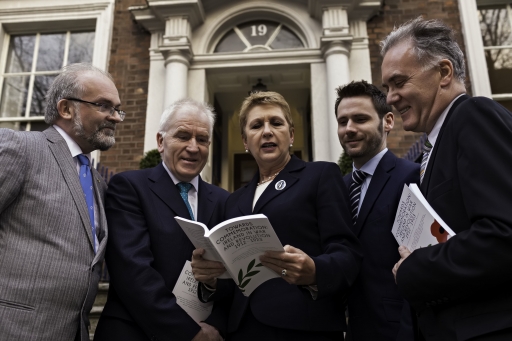Dr. Edward Madigan, Resident Historian at the Commonwealth War Graves Commission, writes for Centenary News about the new book, Towards Commemoration: Ireland in War and Revolution, 1912-1923, of which he is an editor.
The years between 1912 and 1923 were arguably the most transformative in modern Irish history. Beginning with the mass signing of the Ulster Covenant and ending with a bloody civil conflict in the nascent Free State, this long decade of war, revolution and rapid social change gave birth to contemporary Ireland, north and south.
Many of us hold different, even conflicting, views on the real significance of this violent but fascinating period, and we are unlikely to reach a consensus on episodes as contentious as the Easter Rising, the Battle of the Somme or the War of Independence.
We can all hopefully agree, however, that the centenaries of these momentous events provide a valuable opportunity to engage with our past openly and creatively, and to emerge with a much richer understanding not only of the decade itself but also of the remainder of the twentieth century.
What that process might mean, and where its pitfalls and potential lie, is the subject of a recently published volume of essays.
“Political and cultural challenges of commemoration”
Towards Commemoration: Ireland in War and Revolution, 1912-1923 features 18 essays by an eclectic group of historians, civic activists, political representatives and media commentators.
Written in an engaging, accessible style, the volume seeks to make a constructive contribution to the emerging debate on centenary commemoration.
Although much of the commentary focuses on Irish experience and memory, the book also contains vivid comparisons with Britain, France and Australia.
The final section of the volume deals specifically with the political and cultural challenges of commemoration and is relevant to the question of commemoration in any national context.
The book has been published by the Royal Irish Academy and arises from a project led by the Centre for War Studies, Trinity College Dublin, in association with the Princess Grace Irish Library, Monaco.
“Help communities move beyond the violence”
Towards Commemoration was launched in Dublin at Easter by former Irish president Mary McAlesse. Professor McAleese was inaugurated on Armistice Day 1997 and during her two terms in office was at the forefront of efforts to use the Irish memory of the First World War to help communities move beyond the violence of the more recent past.
These efforts culminated in the resounding success of Queen Elizabeth II’s visit to Ireland in May 2011, during which the Queen and the President laid wreaths at the Garden of Remembrance and Ireland’s National War Memorial in Dublin.
In a moving speech at the Royal Irish Academy building on Dawson St., Professor McAleese welcomed the publication of Towards Commemoration and had the following to say about the markedly different atmosphere that prevailed in Ireland during the fiftieth anniversary commemorations of the Battle of the Somme and the Easter Rising:
‘The secret is in the title Towards Commemoration. I’m old enough to remember, regrettably, the last big decade of commemorations, fifty years ago. Back in Belfast, when we had the fiftieth anniversary of the Somme and the fiftieth anniversary of the Rising, and there were no clusters of people like there are today, who are determined to take control of the process of commemoration’.
‘There was no Good Friday Agreement. There was no talk of ‘parity of esteem’. What there was, was just the raw, raw tension of un-reconciled, un-healed, fragmented communities struggling to try to find their way on a day-to-day basis to live with each other and clinging to commemoration’.
‘Clinging so hard to commemoration that healing and reconciliation would be postponed for the best part of another fifty years. And, frankly, if you’ve ever lived in a place that fell apart. If you’ve ever come home from school and wondered would you get home. If you’ve ever gone to bed at night and wondered would you wake up in the morning – would your father get home from work … Believe you me, you would understand why this book is so important’.
‘… For me, this book is the reassurance that this decade of centenaries is guided, maybe even choreographed, by the angels.’
“Culture of commemoration in which centuries-old divisions were reinforced”
Until quite recently in Ireland, the First World War and the Irish Revolution were generally viewed as separate, only vaguely related events and people tended to commemorate either servicemen or revolutionaries depending on the community they belonged to.
This gave rise to a culture of commemoration in which centuries-old divisions were reinforced every time a major anniversary occurred.
None of the authors in Towards Commemoration have the final word on history or memory, but we hope the book will help people recognise the extraordinary complexity of this fascinating decade and to realise that one group does not have to be commemorated at the expense of the other.
Further Information:
A video of Professor McAleese’s speech at the launch of Towards Commemoration can be viewed here.
The following authors have contributed to Towards Commemoration: Ian Adamson, Paul Bew, Tom Burke, Paul Clark, Anne Dolan, David Fitzpatrick, Brian Hanley, Tom Hartley, John Horne, Keith Jeffery, Pierre Joannon, Heather Jones, Edward Madigan, Fearghal McGarry, William Mulligan, Fitntan O’Toole, Catriona Pennell, Stuart Ward, Jay Winter.
© Centenary Digital Ltd & Author
